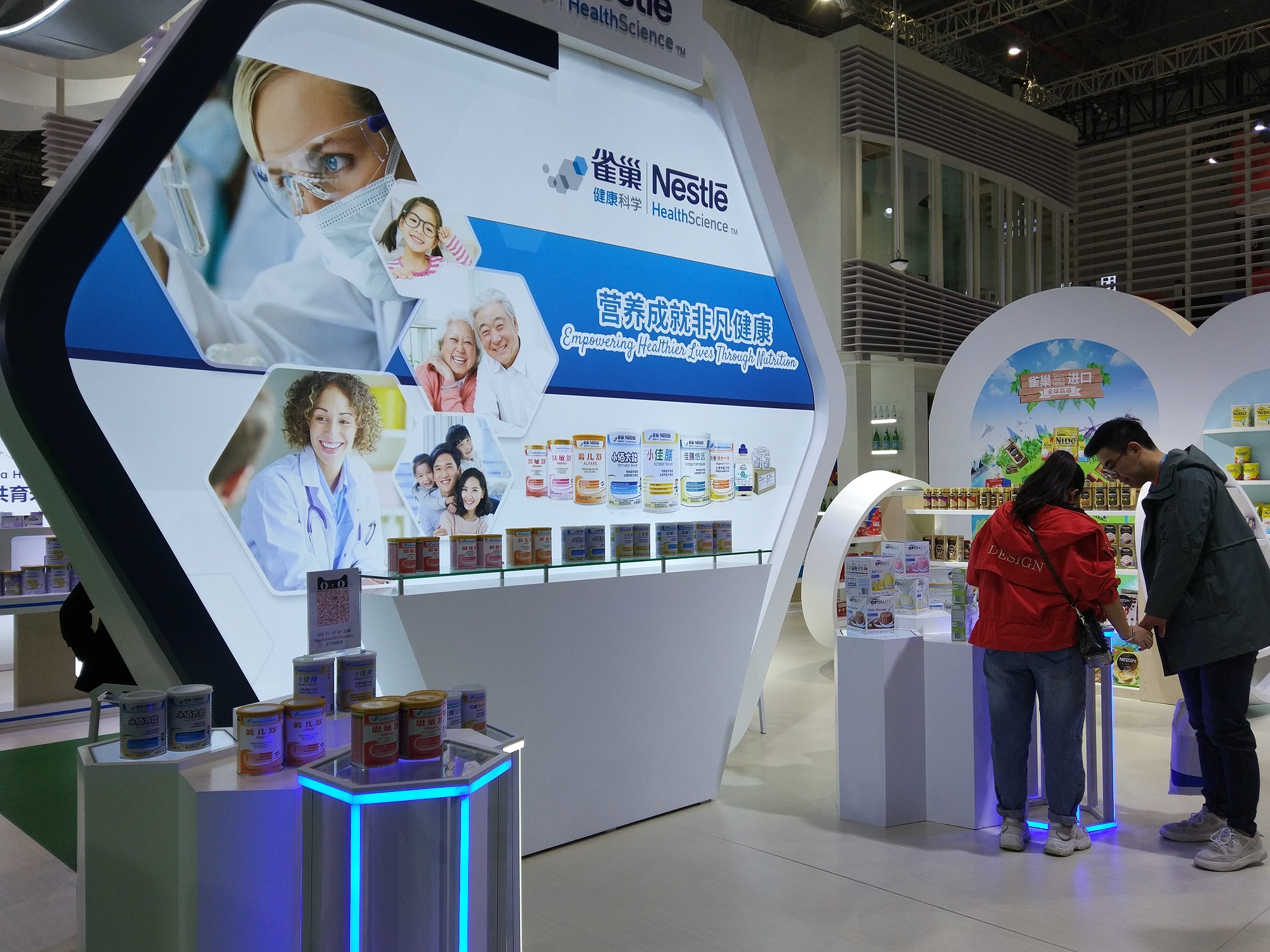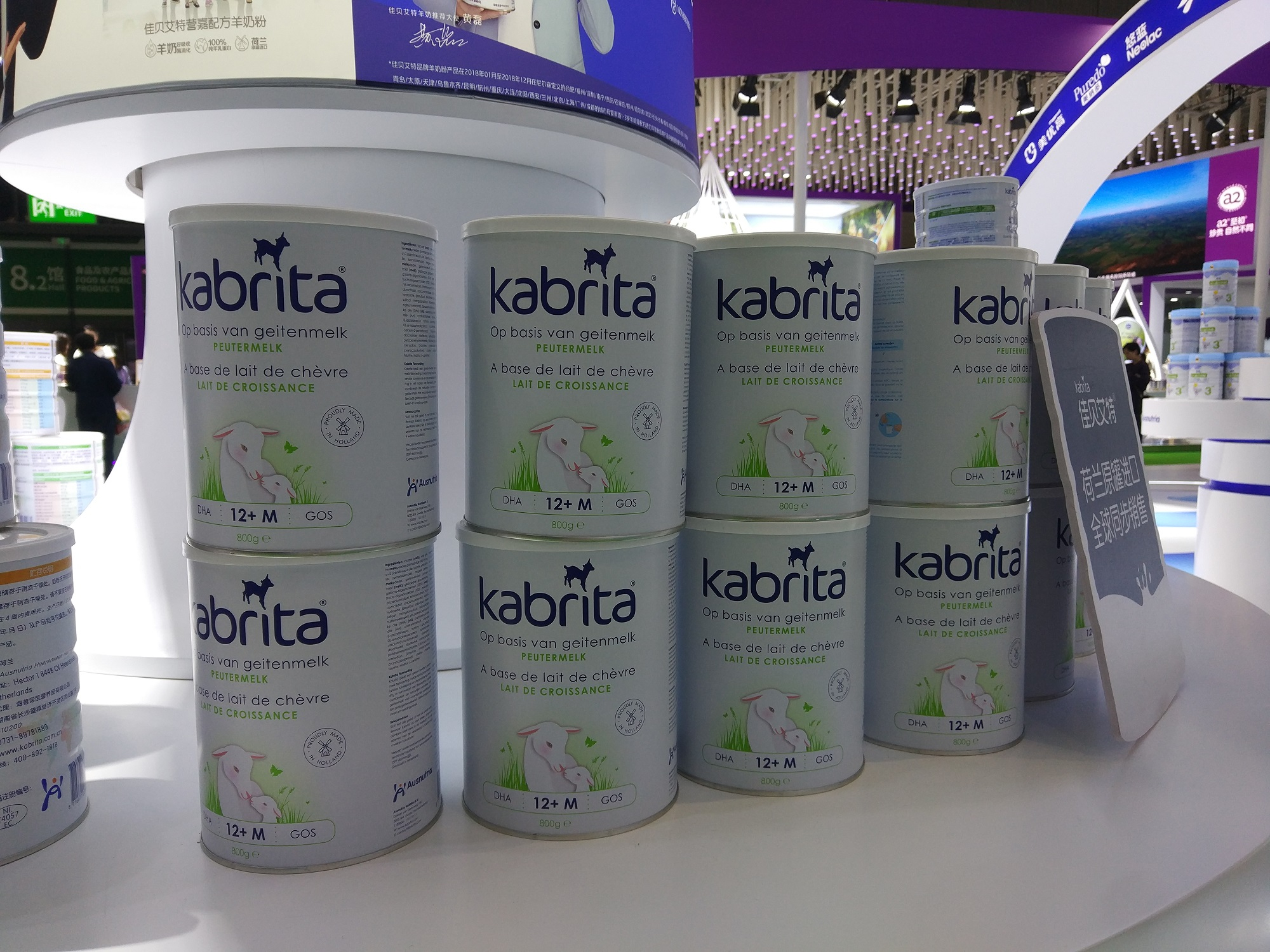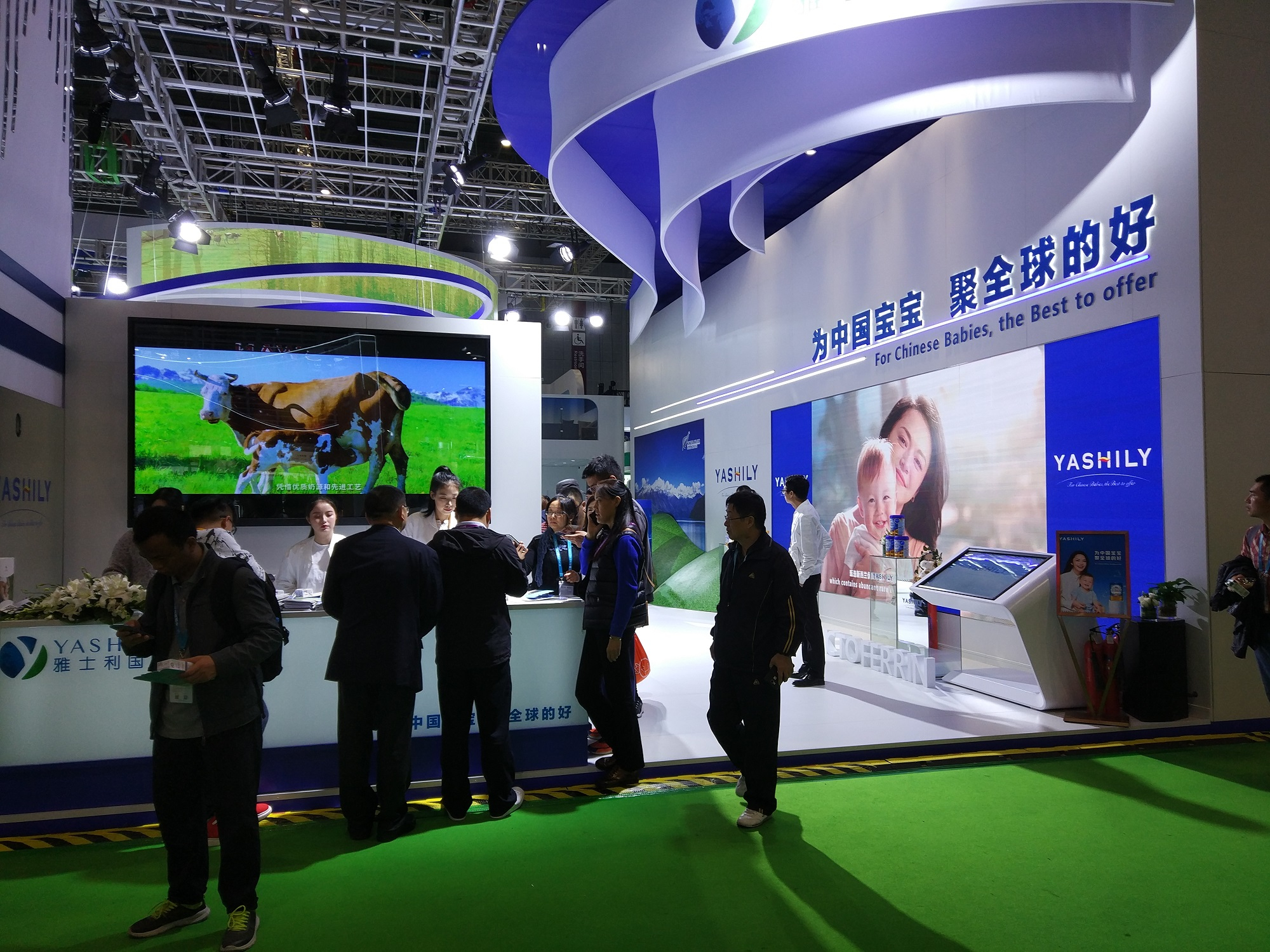Life-sized fake cows, videos of idyllic green pastures and towers of milk powder tins: One thing that will hit visitors entering the food pavilion at the China International Import Expo (CIIE) is the number of dairy companies on show.
From global giants like Danone, Nestle and Fonterra to smaller niche producers, over a dozen companies offering dairy and non-dairy alternatives are competing for space at this year's CIIE.

A display at the Nestle stand at the China International Import Expo in Shanghai, China, November 9, 2019. /CGTN Photo
A display at the Nestle stand at the China International Import Expo in Shanghai, China, November 9, 2019. /CGTN Photo
China is by far the world's biggest importer of milk – bringing in over 14.6 million tonnes last year, almost 20 percent of the global total, according to the UN's Food and Agriculture Organization – and it is set to overtake the U.S. as the world's biggest dairy market by 2022, according to Euromonitor research.
But Chinese consumers are not putting just any cow's milk in their shopping bags – increasingly, they are reaching for higher-quality organic products, or alternatives from goats, sheep and even nuts.
And foreign companies have taken notice.
"Fresh dairy is hard to come by here, so a lot of our customers prefer the quality and freshness of our milk compared to what's available currently on the Chinese market," Rylee Brodie, warehouse and purchasing manager at Avalon, a Canadian dairy company from British Columbia, told CGTN.
Avalon only sells one type of organic fresh homogenized milk in China but "organic milk is currently in high demand, and supply is not meeting demand," she said. The company now hopes to expand its product offering here in the future.
Denmark's Nordfarm has been selling its Solmark lactose-free organic milk powder on China's online platform Taobao but is now looking for agents to distribute it in shops.
What attracted the brand to China was "the size of the market naturally, and also the preference for the quality that Danish dairy can deliver," said Nordfarm CEO Carsten Blom-Hanssen.
About 85-90 percent of east Asians are lactose intolerant, compared to less than 30 percent of Europeans, meaning that lactose-free products like Solmark are particularly well received here.
This is also a major selling point for alternatives like goat's or sheep's milk, which contain less lactose than cow's milk and are more easily digested.

Tins of powdered goat's milk for babies are on display at the China International Import Expo in Shanghai, China, November 9, 2019. /CGTN Photo
Tins of powdered goat's milk for babies are on display at the China International Import Expo in Shanghai, China, November 9, 2019. /CGTN Photo
"It's the best milk among dairy milk," said Natalie Dang, general manager of New Zealand organic dairy company Maui, which specializes in sheep's milk. "It's nutritious... gentle, has A2 protein, it's very good for the stomach and very good for the gut."
Maui currently produces two million liters of sheep's milk per year but only sells it in powdered form, in sachets, to China. In the future, the company hopes to also sell the fresh product here. And China could become a market worth eight billion New Zealand dollars (35.4 billion yuan) for Maui, said Dang.
Paying for quality
These premium products don't come cheap. A box of Solmark lactose-free organic milk powder containing 15 sachets costs 228 yuan (32.5 U.S. dollars) – or about two U.S. dollars per glass.
A Maui box of 15 sachets adds up to 658 yuan (94 U.S. dollars).
One liter of local non-organic milk, in comparison, sells for 14 yuan (two U.S. dollars) in China.
What customers are paying for is a high-grade product. Milk from countries like New Zealand is seen here as "very pure, very clean, very high quality," said Na Li, brand manager at Yashili New Zealand Dairy Company, which produces powdered goat's milk for babies, among others.

Visitors stop by the Yashili New Zealand Dairy Company stand at the China International Import Expo in Shanghai, China, November 9, 2019. /CGTN Photo
Visitors stop by the Yashili New Zealand Dairy Company stand at the China International Import Expo in Shanghai, China, November 9, 2019. /CGTN Photo
"People in China are becoming more and more affluent and want to get the best for their babies," she added.
"From the Expo, you can see that Chinese people don't care about price, they care about quality," added Nordfarm's Asia-Pacific marketing director Candy Li.
Healthy and trendy
More than just a beverage, Dang said Maui's product "is really a lifestyle" and appeals especially to customers who are health conscious.
Trendiness is also part of Milkadamia's brand. The family-owned macadamia farm in eastern Australia has turned to producing macadamia milk. Already present in the U.S., UK, Malaysia, Singapore and Hong Kong, it is now setting its sights on the Chinese mainland.
Milkadamia is "very much targeted to a specific type of consumers who don't mind spending more for a better-for-you, better-for-the-environment product," co-founder Morgan Roy told CGTN.
China is already driving demand for macadamia nuts, so coming here with macadamia milk was a natural step. As an alternative to dairy that markets itself as being "free of soy, GMOs (and) gluten", it is also an ideal product for people who are lactose intolerant or have specific dietary requirements, such as vegans.
And there's the novelty factor. "Soy milk has been popular for so long, consumers are now looking for alternatives," said Roy.
Organic wake-up
Organic products and veganism may still be more common in places like Europe, North America and Australia. But such trends are "coming now to China," said Blom-Hanssen.
And even if it doesn't conquer the entire Chinese market, Milkadamia is happy to win over just a small segment of the country's 1.4 billion strong population.
"Of course, we won't receive national enthusiasm, we probably won't get much enthusiasm from the older population... but young people get it," said Roy.
At last year's CIIE, visitors still turned up their noses at sheep's milk – they apparently associated it with goat's milk and expected it to have a strong smell – but this year they have shown much more interest, Dang also noted.
"So the market is waking up," she said.
(Cover: A dairy company's display at the China International Import Expo in Shanghai, China, November 9, 2019. /CGTN Photo)